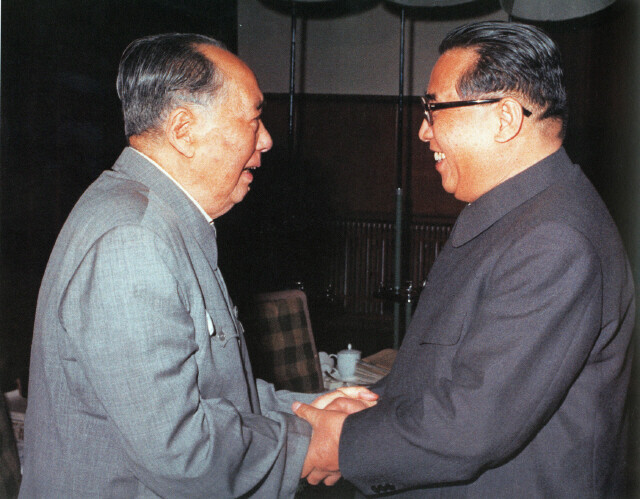hankyoreh
Links to other country sites 다른 나라 사이트 링크
Chinese professor sheds light on meeting between Mao and Kim Il-sung

The image was captured at the home of Chinese President Mao Zedong in Beijing’s Zhongnanhai garden on April 18, 1975. In it, the elderly Mao and North Korean leader Kim Il-sung could be seen smiling broadly and sharing a warm handshake. But the content of their last conversation remained a mystery that had never been made public in detail before.Now East China Normal University professor Shen Zhihua has unearthed information that could give a definitive answer that question, which he shares in his new book “The Last Heavenly Dynasty: China and North Korea in the Age of Mao Zedong and Kim Il-sung,” the Mainichi Shimbun, Asahi Shimbun and other Japanese newspapers reported on Sept. 1.
The meeting between Mao and Kim came at a moment of upheaval, when Ho Chi Minh had scored a decisive victory against the US in Vietnam and the Communist regime of Pol Pot was bringing down a pro-American government in nearby Cambodia.
“[The Vietnamese’s] victory is like our victory,” Kim said of the developments, attempting to communicate to Mao that he wanted to achieve a similar kind of unification by armed force on the Korean Peninsula. But Mao, who had opened the way for detente with the US following a historical 1972 visit to China by then-US President Richard Nixon, continued to sidestep the topic.
“I don’t want to discuss political matters anymore,” he finally said. The dialogue ended on a cool note after 30 minutes.
“Kim did not say at the meeting that he wanted a second Korean War, but he did address the issue within the Workers’ Party of Korea prior to his China visit,” Shen said in an interview with the Mainichi Shimbun. “It’s clear that he did think about it.”
The description of events suggested the talks ended in failure, with Mao responding coolly to Kim’s continued dreams of armed reunification.
“There has been speculation that China declined to offer support in 1975 for the armed reunification that North Korea wanted, but no specifics had ever come to light,” said Korean Peninsula expert and Keio University emeritus professor Masao Okonogi in an interview with the Mainichi Shimbun. “Kim must have come away [from the talks] with a real sense that China wouldn’t help them when it counted.”
The analysis suggests the result led to Pyongyang parting ways with Beijing for an autonomous national defense approach, which led in time to the ongoing issue of North Korea’s nuclear program.
By Gil Yun-hyung, Tokyo correspondent
Please direct questions or comments to [english@hani.co.kr]

Editorial・opinion
![[Column] Season 2 of special prosecutor probe may be coming to Korea soon [Column] Season 2 of special prosecutor probe may be coming to Korea soon](https://flexible.img.hani.co.kr/flexible/normal/500/300/imgdb/original/2024/0426/3317141030699447.jpg) [Column] Season 2 of special prosecutor probe may be coming to Korea soon
[Column] Season 2 of special prosecutor probe may be coming to Korea soon![[Column] Park Geun-hye déjà vu in Yoon Suk-yeol [Column] Park Geun-hye déjà vu in Yoon Suk-yeol](https://flexible.img.hani.co.kr/flexible/normal/500/300/imgdb/original/2024/0424/651713945113788.jpg) [Column] Park Geun-hye déjà vu in Yoon Suk-yeol
[Column] Park Geun-hye déjà vu in Yoon Suk-yeol- [Editorial] New weight of N. Korea’s nuclear threats makes dialogue all the more urgent
- [Guest essay] The real reason Korea’s new right wants to dub Rhee a founding father
- [Column] ‘Choson’: Is it time we start referring to N. Korea in its own terms?
- [Editorial] Japan’s rewriting of history with Korea has gone too far
- [Column] The president’s questionable capacity for dialogue
- [Column] Are chaebol firms just pizza pies for families to divvy up as they please?
- [Column] Has Korea, too, crossed the Rubicon on China?
- [Correspondent’s column] In Japan’s alliance with US, echoes of its past alliances with UK
Most viewed articles
- 1AI is catching up with humans at a ‘shocking’ rate
- 2‘We must say no’: Seoul defense chief on Korean, USFK involvement in hypothetical Taiwan crisis
- 3[Column] Season 2 of special prosecutor probe may be coming to Korea soon
- 4Division commander ordered troops to enter raging flood waters before Marine died, survivor says
- 5Is Japan about to snatch control of Line messenger from Korea’s Naver?
- 6Korea protests Japanese PM’s offering at war-linked Yasukuni Shrine
- 7Is N. Korea threatening to test nukes in response to possible new US-led sanctions body?
- 8One Hyundai worker suffers through 16 piecemeal contracts in 23 months
- 9[Photo] Migrant workers rally for labor rights
- 10Korea once again ranks near bottom of list for gender parity, report shows